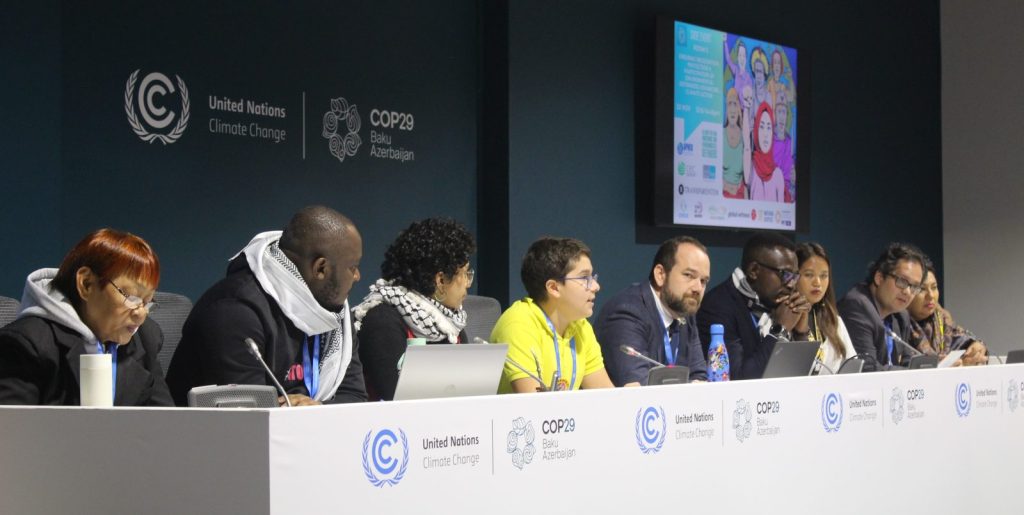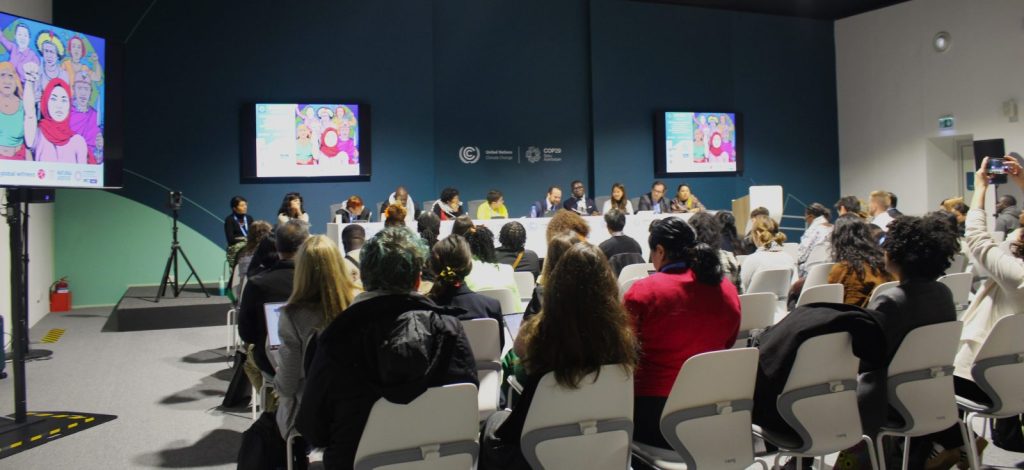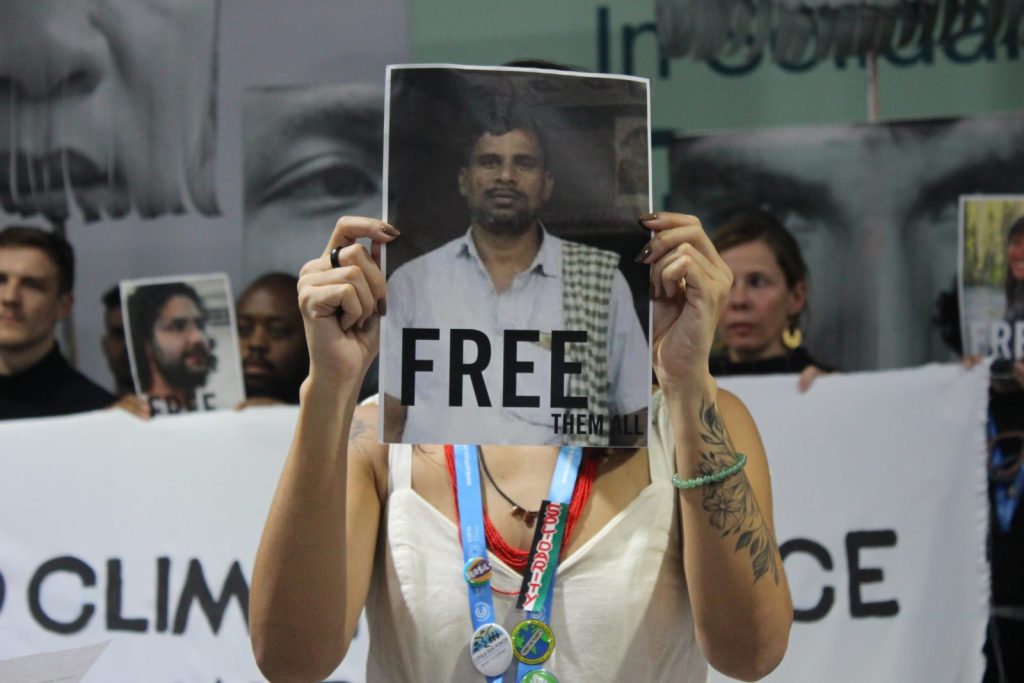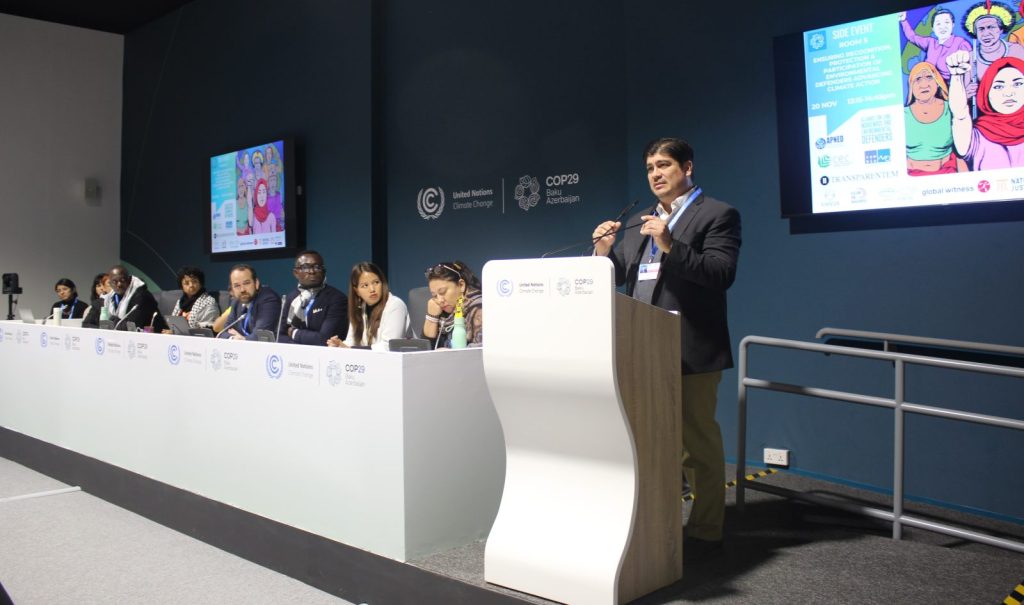Governments’ failure to protect environmental human rights defenders is a threat to climate justice and democracy, was the resounding message at a side event held parallel to the COP29 climate negotiations taking place at the sports stadium in Baku in Azerbaijan. Defenders, civil society and constituencies from across the globe convened to discuss the plight of environmental human rights defenders protecting their land, the climate and biodiversity.
Natural Justice, together with the Office of the High Commissioner on Human Rights (OHCHR), Earth Rights International, Global Witness, CambiaMo, Civicus, Apned and other NGOs, called for the urgent need to recognise and protect environmental defenders who are facing increasing attacks for their activism, and fight for land and climate justice.
This collation of organisations has convened side events every year at COP since 2022 to amplify the plight of defenders and encourage states to fulfil their obligations to protect human rights.

“Defenders are not only fighting for their lives, land and livelihoods, they’re fighting for every single one of us. They continue to put their lives on the line everyday – without their activism, we have little hope of safeguarding environmental democracy. Governments have an obligation to safeguard their rights and ensure and enabling environment for their participation. It’s high time the scourge of attacks and repression of defenders and Indigenous Peoples is taken seriously,” said Katherine Robinson, Head of Campaigns at Natural Justice.
Environmental human rights defenders (EHRDs) are the driving force in advocating for the urgent actions needed to confront the triple planetary crisis. However, they are paying a high price for their leadership. Global Witness reports that at least 1,390 environmental defenders were killed between the 2015 adoption of the Paris Agreement and December 2022. More than a third of the defenders murdered in 2022 were Indigenous peoples. And as a report by the Alliance for Land, Indigenous and Environmental Defenders (ALLIED) notes, this is just the tip of the iceberg in terms of threats to EHRDs.
Speaking on the panel, Francisco Vera, a young defender from Colombia said: “We need a justice system that recognises us children and youth as human rights defenders. When we receive threats, the state doesn’t act because we are not recognized as defenders nor as citizens, and this impunity only fuels violence and more repression.”
Rhoda Dalang, a speaker and defender from the Cordillera People’s Alliance in the Philippines, reminded the audience that the Philippines is one of the most dangerous countries in the world for defenders. She said that Strategic Lawsuit Against Public Participation (SLAPP) suits are used to silence activists trying to protect their natural resources from being exploited for profit.
“Defenders are designated as terrorists and their bank accounts are frozen. How can we continue our activism under these circumstances?” asked Dalang.

Sharing a similar story, Bob Barigye, Defender from Uganda, part of the Stop EACOP Campaign said he had been arrested seven times in 2024 for defending the environment. “Students who protested against EACOP ahead of COP29 were arrested and are still incarcerated in a maximum-security prison with capital offenders. It’s done to intimidate and silence us,” explained Barigye.
Bruna Balbi- Coordinator of Amazon program, Tierra de direitos in Brazil, highlighted the gendered dimensions of reprisals faced by women defenders.
“Three defenders are being killed every month in Brazil. They are mostly Black, Indigenous women. But they won’t stop us, because we continue to be reborn,” concluded Balbi.
In response to the scourge of violence against women defenders, Gina Cortés Valderrama from the Women and Gender Constituency admonished states for rolling back 10 years of progress on advancing human rights language in the negotiations, saying, “For defenders this is a matter of life and death. But language on gender, human rights and diversity, and Free Prior and Informed Consent (FPIC), is being eroded in all texts. What we see in the gender negotiations is a threat to all of us and our collective humanity.”
This is the first time in COP history that the COP has included language on defenders, but regrettably the reference in the gender text is bracketed along with other refences to human rights.
Natalia Gomez explained that this regression and roll back also comes down to host countries’ lack of leadership explaining that limited civic space in Baku and Azerbaijan has a direct impact on negotiations and participation at the COPs.
“We have a growing number of lethal attacks – that’s just the tip of the Iceberg. There are so many other attacks we don’t see, and the numbers are shocking, yet the governments here refuse to recognize this while negotiating climate policy,” continued Gomez.
Patricia Mungcal a youth representative from the Philippines encouraged people to push back against the erosion of rights language saying, “My call is to protect what we have fought for at previous COPs, let’s push back against silencing and continue create spaces for inclusion and solidarity. We must maximize grassroots solidarity.” She added that the COP negotiations are empty without a critique on wars, militarization and bombings across the world.
In recent years, there have been important positive steps at the multilateral level to respond to these repressive trends and increase recognition, participation, and protection of environmental defenders. Multilateral mechanisms such as the Aarhus Convention, Escazú Agreement, and the UN Human Rights Council have adopted instruments and undertaken actions to protect and engage EHRDs.
In his closing remarks Carlos Alvarado, Former President of Costa Rica and Club de Madrid Member regretted Costa Rica’s failure to ratify Escazu. “There was a strong narrative pushed that the Escazu is bad for business. It’s my hope we can further protect activists who are protecting the whole of planet. We need to continue raising awareness about this and take action,” Alvardo said.

Later, activists, defenders and civil society organisations rallied outside the delegation pavilion to commemorate those who were murdered for their activism and to call for the freedom of defenders who have been unlawfully incarcerated.
“No climate justice without human rights! – Free the defenders, free them all!” reverberated through the corridors of the Baku sports stadium as the stories of many fallen and detained heroes were shared.
COP29 comes to an end this week. Meanwhile activists continue their fight for justice and self-determination and hope to see a shift in the lead up to COP30 in Brazil.

